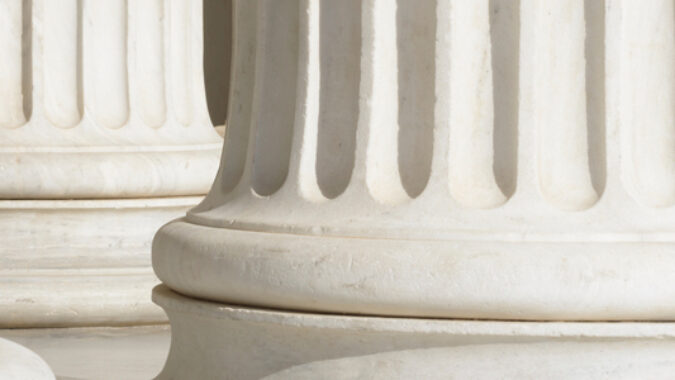NJBIA understands the laudable goal of the sponsor to address non-point source pollution, flooding and infrastructure needs. However, we believe a comprehensive plan for our water infrastructure that also mitigates the impact on ratepayers should instead be considered versus a new tax on ratepayers.
New Jersey is the most taxed state in the nation and our companies and residents are challenged by affordability and the overall cost of living here. For many businesses, the fees authorized in this bill would amount to double taxation, as many facilities already are required to obtain stormwater permits for their operations.
Please read our submitted testimony below.
On behalf of our member companies that provide more than 1 million jobs in the state and make the New Jersey Business & Industry Association the largest statewide business association in the country, we are OPPOSED to S-1073 (Smith, Bateman) which creates stormwater utility fees.
NJBIA understands the goal of the sponsor to address non-point source pollution, flooding and infrastructure needs. However, we believe what is needed is a comprehensive plan for our water infrastructure that also mitigates the impact on ratepayers verses a new tax on ratepayers.
New Jersey is the most taxed state in the nation and our companies and residents alike are challenged on issues of affordability and the overall cost of living in New Jersey. For many businesses the fees authorized in this bill would amount to double taxation. Many facilities already are required to obtain stormwater permits for their operations. Under those permits, companies are required to pay application fees and oversight fees that run in the thousands of dollars. Furthermore, these facilities are required to mitigate impacts to stormwater as a requirement under the permits. In short, they are already taking steps to accomplish the goal of the bill.
Under this legislation, companies would be assessed a fee by a local stormwater authority, even if they already have a stormwater permit. Furthermore, there is no guarantee that these fees will be used for their intended purposes. In these tough budgetary times when State aid to municipalities is diminishing, a new revenue source such as this may simply go toward covering existing expenses instead of being dedicated to their intended purpose under the bill.
As previously mentioned, many facilities already are required to obtain storm water permits for their operations. Under those permits, companies are required to pay application fees and oversight fees that run in the thousands of dollars. Furthermore, these facilities are required to mitigate impacts to storm water as a requirement under the permits. In short, they are already taking steps to accomplish the goal of the bill.
Furthermore, paragraph 2(a)(4) of the legislation references the 21 urban New Jersey municipalities that have combined sewer systems. Under NJPDES permit mandates,
these municipalities are undergoing a collaborative process with the wastewater utilities to develop a plan for the reduction of stormwater to the wastewater treatment systems (WWTS). This process will yield a plan that will result in the increase in rates by the WWTS. A stormwater utility tax would be in addition to the increases in WWTS rates that will occur. Thus, businesses and homeowners in these municipalities will be double taxed.
The bill also allows for funds to be diverted into the general fund. NJBIA has consistently opposed the practice of balancing the state budget by siphoning revenues away from special funds created for specific purposes, such as the Clean Energy Fund. This is not the intended use of ratepayer funds. Furthermore, the bill permits up to 5% of fees collected by the stormwater utility to be directed to the local government budget. Again, this is another diversion of ratepayer funds.
Recognizing the intent of the bill is to prevent stormwater runoff and improve the stormwater system, the bill does not outline any requirements for the stormwater utility to implement stormwater mitigation plans or do infrastructure improvements. It merely mentions what the funds can be used for.
Section 2. (b) of the bill calls for the “use of green infrastructure…”. While this provision is a laudable goal and green infrastructure does have multiple benefits, it should not be required via this legislation. Some small municipalities simply do not have the land available for cost-effective green infrastructure.
In section 15. (New section) a. “Within 18 months after the effective date of this section, the Department of Environmental Protection, in consultation with the Board of Public Utilities and the Division of Local Government Services in the Department of Community Affairs, shall develop a stormwater utility guidance manual. The department shall periodically update the guidance manual as the department deems appropriate. The guidance manual shall include, but need not be limited to”. The DEP already has multiple guidance manuals that serve this purpose. See http://www.nj.gov/dep/dwq/cso-guidance.htm in section 16. (New section) a. “There is established in the General Fund a special non-lapsing account to be known as the “Clean Stormwater and Flood Reduction Fund.” The already existing Municipal Infrastructure Loans Bank has available funding for this purpose. In fact funds sometimes go unutilized by municipalities even when available.
The bill does not limit both a municipality and a county from forming a stormwater utility. Thus, some areas may have both a municipal and county stormwater utility.
The bill does not specify how fees would be set in each stormwater utility. Thus, variation will occur between each stormwater utility. The bill also does not specify what stormwater improvements would be acceptable for a credit. This will lead to a lack of consistency among stormwater utilities and create uncertainty for ratepayers.
The stormwater utility can also increase fees above the 2 percent property tax cap. This provision in the bill is in direct contrast to controlling local property taxes.
The bill does not indicate what specifications will be used to determine runoff. Will the specifications be consistent among all stormwater utilities?
NJBIA looks forward to working with the Legislature on a comprehensive plan that takes into account our water infrastructure needs and ways to increase efficiencies, modernize systems, and mitigate impacts on ratepayers.







